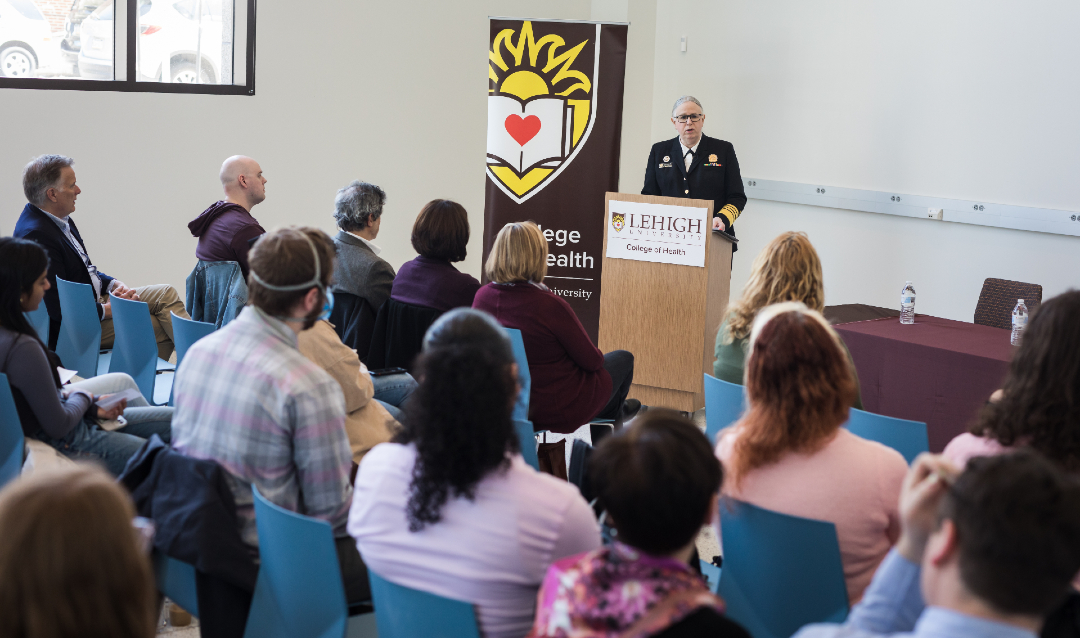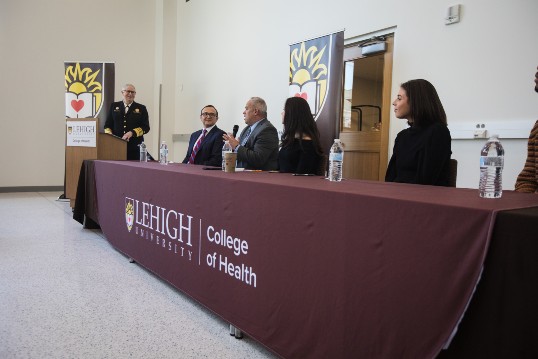Levine said that increasing access to behavioral and mental health care – along with barriers to rural families such as poor access to broadband services and devices for expanding telehealth services – were priorities moving forward.
Initiatives to better integrate physical and mental well being services in clinics and across medical disciplines were among the solutions she offered to create better health care access.
Her talk, “Challenges and Opportunities Facing Public Health Perspectives from the Assistant Secretary for Health” touched on federal initiatives including:
- Substance abuse and recovery programs
- The value of Diversity, Equity and Inclusion in ongoing conversations across all sectors of society
- LGBTQI+ care access and opportunities
- The intertwined impacts of climate change and public health to vulnerable communities
- The lifesaving value of Narcan (Naloxone) available as a spray to reverse overdose events without negative side effects to the person in crisis
“It [Narcan] does not solve the crisis but if someone is alive, then there is hope for recovery,” Levine said.
Safe injection sites or supervised consumption sites for those using illegal drugs are operating in some major cities in Canada and Europe have been proposed in the U.S. – without much success.
So far, the country’s first and only legal safe injection site, which opened in November 2021, is in New York City and privately run according to The New York Times.
Syringe Services Programs (SSPs) can provide prevention of associated diseases like HIV and hepatitis by intravenous substance users. While illegal in Pennsylvania, both Philadelphia and Pittsburgh and some other cities are offering this service via local authorization. Levine said there are currently no SSPs in Allentown or Bethlehem.
Nationwide, the overdose crisis accelerated during the past two years. “In 2020/21, 105,000 people died from a drug overdose,” Levine said.
She said that while teen drug addiction rates appear down, the new, cheap synthetic drug version of fentanyl – often disguised or mixed with other illegal substances without the knowledge of the buyer – are escalating overdose deaths. This powerful, lab-made drug is so potent it can easily kill first-time users. The CDC reports that fentanyl is 50 to 100 times stronger than morphine.
“We need medical students, nurses, pharmacists and nurse practitioners to learn more about public health. Public health is the center of our universe right now,” Levine said.
The event was sponsored by the College of Health and its Institute of Health Policy & Politics. It was also promoted by the Bradbury-Sullivan LGBT Community Center in Allentown, Lehigh’s Pride Center, Lehigh’s Women Gender and Sexuality Studies and Lehigh’s Health Medicine and Society programs.
Levine was nominated to her current role by President Joe Biden and confirmed by the U.S. Senate in 2021. She is the nation’s highest ranking, openly transgendered public official.
She is a pediatrician and was formerly Pennsylvania’s physician general. Nominated by Gov. Tom Wolf in 2015, the state Senate unanimously confirmed her. She was named Pennsylvania’s Secretary of Health in 2018.
She is a graduate of Harvard College and Tulane University School of Medicine.
Her previous posts included vice-chair for clinical affairs for the Department of Pediatrics, and chief of the Division of Adolescent Medicine and Eating Disorders at the Penn State Hershey Medical Center.






